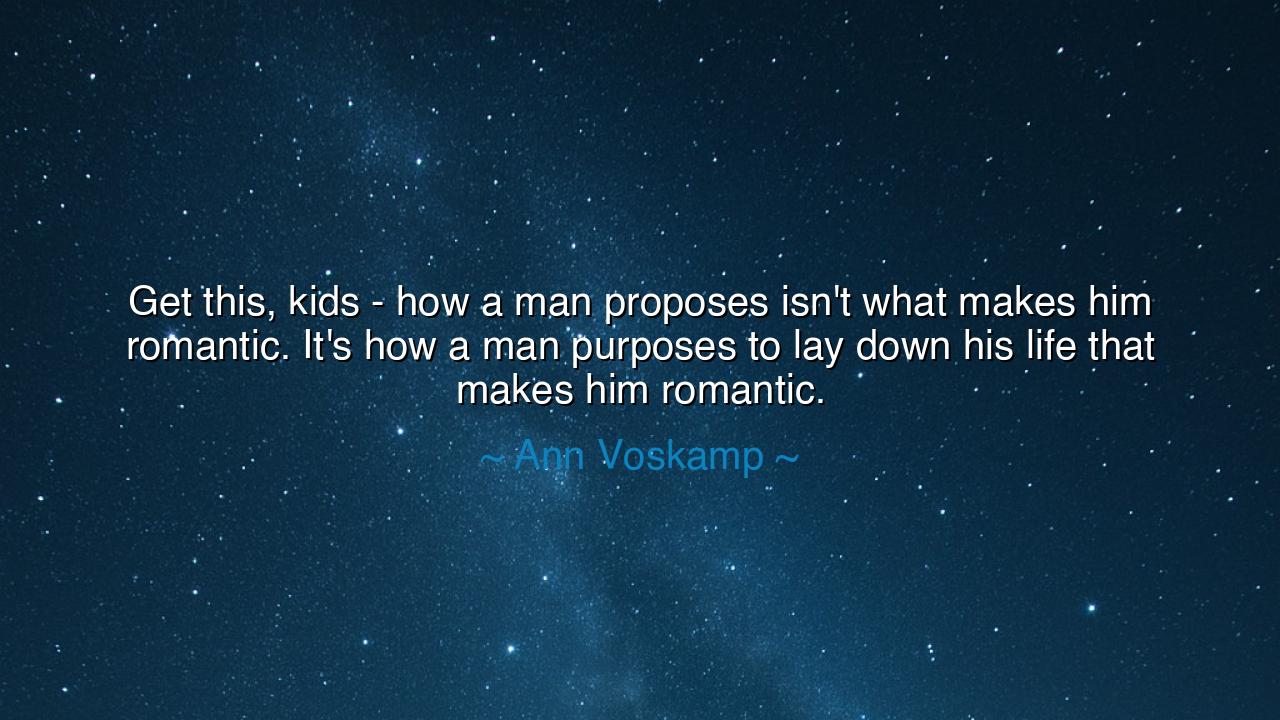
Get this, kids - how a man proposes isn't what makes him
Get this, kids - how a man proposes isn't what makes him romantic. It's how a man purposes to lay down his life that makes him romantic.






"Get this, kids – how a man proposes isn't what makes him romantic. It's how a man purposes to lay down his life that makes him romantic." These words from Ann Voskamp strike at the very heart of what it means to live a romantic life. In a world where the gesture of love is often measured by the grandness of proposals, Voskamp calls us to reconsider the essence of romance. True romanticism, she suggests, is not about the moment of the proposal, the flowers or the ring, but about the deeper, unseen acts of self-sacrifice, commitment, and devotion that form the bedrock of a lasting love. It is the purpose to lay down one’s life—not in a literal sense alone, but in the everyday acts of love, service, and selflessness that define a true partner.
In the ancient world, the concept of sacrifice was intertwined with the very idea of heroism and honor. Homer’s Iliad and Odyssey are filled with heroes whose acts of valor are not defined by grand gestures of love, but by the quiet, often painful sacrifices they make for those they love. Consider Achilles, who, despite his deep rage, ultimately makes the choice to return to battle for the sake of Patroclus, his closest companion. Achilles does not seek honor for himself, but sacrifices his peace for the greater good. Similarly, Odysseus, in his ten-year journey home, faces countless challenges not for the glory of the world, but for the love of his family, his wife Penelope, and his son, Telemachus. These ancient stories teach us that the truest form of love and romance is not found in the fleeting, dramatic moments, but in the quiet, sustained sacrifices made for another’s well-being.
The romance that Voskamp speaks of mirrors these ancient ideals. To truly love is to be willing to lay down one’s own desires and comfort for the good of another. The grand gesture of a proposal—though beautiful—is but a moment in time, but the purpose to sacrifice oneself for the well-being of another is a journey that lasts a lifetime. Think of the great leaders and warriors of the past, who, though burdened with the weight of their responsibilities, were driven by a deeper love for their people. King Arthur, though a figure of legend, is often seen as the ideal knight—one who, despite the turmoil of his own heart, makes sacrifices for the kingdom he serves, and for the loyalty of his knights.
Voskamp’s words echo a deeper truth: romantic love is not about showing off in grand moments, but about the quiet acts of devotion that weave the fabric of a lasting relationship. The sacrifice of oneself for another is at the heart of true romanticism—a love that goes beyond emotional passion to the realm of action and commitment. It is about being willing to place the needs of the other above one’s own desires, to face difficulty and trial for the sake of that love. This is a romantic act far more lasting than any proposal, for it is rooted in a purpose—the purpose to love, to serve, and to give of oneself fully.
In the Bible, we are reminded of this kind of sacrificial love in the story of Christ, who laid down his life not in a dramatic proposal, but in a moment of ultimate sacrifice. This love is not just about grand gestures but about the daily laying down of oneself for the good of others. It is humbling, it is self-giving, and it is the very foundation upon which lasting love is built. Saint Paul writes in his letter to the Ephesians: “Husbands, love your wives, just as Christ loved the church and gave himself up for her.” This love is not about fleeting moments of affection, but about the consistent commitment to the other’s well-being, even at the cost of one’s own.
What, then, is the lesson that we can take from Voskamp’s words? The essence of romance is not in the flash of a moment, but in the sacrificial love that we give every day. It is in the choices we make, not just to love when it is easy, but to choose love even when it is difficult, when it requires sacrifice, and when it calls us to serve without expectation of return. Let us commit to love in this way, not with the grand gestures alone, but in the quiet daily acts that show our love more profoundly than any words or proposals ever could.
As we move through life, let us ask ourselves: how can we purpose to love? How can we lay down our lives—not necessarily in dramatic acts, but in the day-to-day decisions to serve, to care, to be present for those we love? In doing so, we will find that the truest romance is not in the grandiosity of fleeting moments, but in the steadfastness of our commitments. This, indeed, is the greatest love we can offer.






AAdministratorAdministrator
Welcome, honored guests. Please leave a comment, we will respond soon